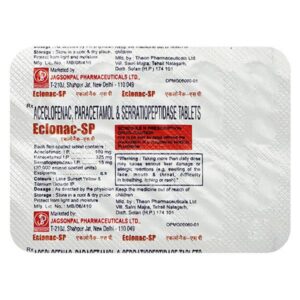ACECLOFENAC + SERRATIOPEPTIDASE + PARACITAMOL
Aceclofenac: Aceclofenac is a nonsteroidal anti-inflammatory drug (NSAID) that is used to relieve pain and inflammation in conditions such as osteoarthritis, rheumatoid arthritis, and ankylosing spondylitis. It belongs to the class of phenylacetic acid derivatives.
The mechanism of action of Aceclofenac involves the inhibition of cyclooxygenase enzymes, specifically COX-1 and COX-2. These enzymes are responsible for the production of prostaglandins, which are mediators of pain, inflammation, and fever. By inhibiting COX enzymes, Aceclofenac reduces the synthesis of prostaglandins, thereby alleviating pain and inflammation.
The typical recommended dose of Aceclofenac is 100 mg or 200 mg, taken orally, once or twice daily. It should be taken with food to minimize the risk of gastrointestinal side effects.
Some of the common side effects of Aceclofenac include stomach pain, nausea, indigestion, diarrhea, flatulence, dizziness, and headache. It may also cause more serious side effects such as gastrointestinal ulcers, bleeding, liver toxicity, and allergic reactions. It is important to consult a healthcare professional if any new or severe side effects occur.
Aceclofenac should be used with caution in individuals with a history of peptic ulcers, gastrointestinal bleeding, liver or kidney impairment, or cardiovascular disorders. It is contraindicated in patients with a known hypersensitivity to Aceclofenac or other NSAIDs, as well as in patients with a history of asthma, urticaria, or allergic-type reactions to aspirin or other NSAIDs.
As with any medication, it is always recommended to consult a healthcare professional for personalized advice and to discuss potential interactions with other medications or existing medical conditions.
Serratiopeptidase: Serratiopeptidase, also known as serrapeptase, is an enzyme derived from the silk worm. It is known for its anti-inflammatory and analgesic properties. Serratiopeptidase is commonly used as a digestive aid and to treat various conditions such as inflammation, pain, and edema.
The exact mechanism of action of serratiopeptidase is not fully understood. However, it is believed to work by breaking down and dissolving non-living tissue, such as dead cells, blood clots, and scar tissue. This helps reduce inflammation, relieve pain, and improve circulation.
The recommended dose of serratiopeptidase can vary depending on the condition being treated. Generally, the typical dose ranges from 10-60mg per day. It is important to follow the instructions provided by your healthcare professional or the product labeling.
While serratiopeptidase is generally well-tolerated, like any medication, it can have side effects. Common side effects may include nausea, gastrointestinal disturbances (such as diarrhea and stomach pain), and allergic reactions. If you experience any concerning side effects or have any pre-existing conditions, it is recommended to consult a healthcare professional before taking serratiopeptidase. Additionally, it may interact with certain medications, so it is important to inform your healthcare provider about any other medications or supplements you are taking.
Overall, serratiopeptidase is commonly used as a natural anti-inflammatory and pain-relieving enzyme. However, it is important to consult with a healthcare professional before starting any new medication to ensure its safety and appropriateness for your specific needs.
Paracitamol: Paracetamol, also known as acetaminophen, is a widely used medication for relieving pain and reducing fever. It belongs to the class of drugs known as analgesics (pain relievers) and antipyretics (fever reducers). Paracetamol is available over-the-counter and is commonly used for mild to moderate pain relief.
The exact mechanism of action of paracetamol is not fully understood. It is believed to work by inhibiting the production of certain chemicals called prostaglandins in the brain that are responsible for transmitting pain signals and causing fever. By reducing the production of these chemicals, paracetamol can provide pain relief and help lower fever.
The recommended dose of paracetamol for adults is typically 500-1000 mg (1-2 tablets) taken every 4-6 hours, up to a maximum of 4000 mg (8 tablets) per day. However, it is important to follow the instructions on the packaging or as directed by a healthcare professional, as the dosage may vary depending on the formulation and concentration of the medication.
While paracetamol is generally considered safe when taken at recommended doses, it can cause side effects in certain individuals. Common side effects may include nausea, stomach upset, and skin rash. In rare cases, allergic reactions or liver damage can occur, especially when the drug is taken in excessive doses or for a prolonged period of time. It is important to seek medical advice if any unusual or severe side effects are experienced.
It is worth noting that paracetamol can be found in combination with other medications, such as in cold and flu remedies or prescription painkillers. Care should be taken to avoid unintentional overdose by carefully checking the active ingredients in these products and ensuring that the total dose of paracetamol does not exceed the recommended daily maximum.

